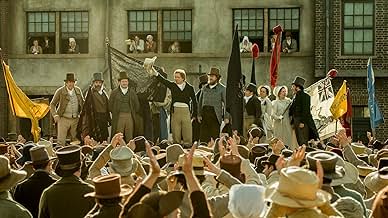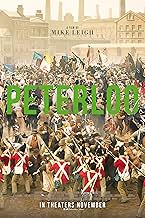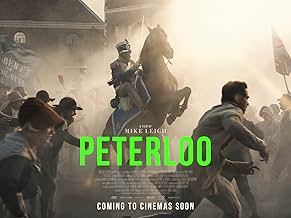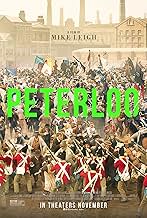IMDb-BEWERTUNG
6,5/10
5823
IHRE BEWERTUNG
Die Geschichte des Peterloo-Massakers von 1819, bei dem britische Truppen eine friedliche Kundgebung für Demokratie in Manchester angriffen.Die Geschichte des Peterloo-Massakers von 1819, bei dem britische Truppen eine friedliche Kundgebung für Demokratie in Manchester angriffen.Die Geschichte des Peterloo-Massakers von 1819, bei dem britische Truppen eine friedliche Kundgebung für Demokratie in Manchester angriffen.
- Auszeichnungen
- 4 Gewinne & 8 Nominierungen insgesamt
Empfohlene Bewertungen
If I have a criticism of this film, it would be that it's half an hour too long. Mike can be a bit self indulgent, there where a few scenes that were just there for colour. Technically accomplished, well acted, and faithfully accurate to the history. If you like social history you will not be disappointed.
Like most working-class Brits, I knew nothing of Peterloo (and I am from Manchester into the bargain).
Mike Leigh has done an excellent job, documenting this momentous event in British history, an event conveniently airbrushed out of my secondary school education. Imagine that.
A good 2.5 hrs long, it would make a decent 12 part Netflix drama. Though, he'd never get the funding for that.
It is long, it is educational, it is historical, it is incredibly worthy. Watch it and draw parallels with the Britain of today. FPTP electoral system, zero-hours contracts, food banks, Brexit, et al.
i gave it a 9.
Mike Leigh has done an excellent job, documenting this momentous event in British history, an event conveniently airbrushed out of my secondary school education. Imagine that.
A good 2.5 hrs long, it would make a decent 12 part Netflix drama. Though, he'd never get the funding for that.
It is long, it is educational, it is historical, it is incredibly worthy. Watch it and draw parallels with the Britain of today. FPTP electoral system, zero-hours contracts, food banks, Brexit, et al.
i gave it a 9.
"Rise like Lions after slumber in unvanquishable number- Shake your chains to earth like dew Which in sleep had fallen on you- Ye are many-they are few." Shelley, from The Masque of Anarchy
No contemporary director depicts and loves the working class better than Mike Leigh: look at Secrets and Lies for the best example. Believing that not enough people know about the massacre in 1819 in Manchester, where the British army slaughtered 18 and wounded scores of commoners peacefully assembling for liberty and rights, Leigh filmed Peterloo, the popular name for the uprising.
With an ear for local locutions and pompous preening, Leigh alternates between the people and their monarchial rulers, showing the sincerity of the marchers and the fear of the magistrates, who wish for nothing more than a Waterloo to stem the French-revolution-like yearnings of the folk. When administrators order the soldiers to squash the gathering, it's the beginning of responsible press reporting the malignity of entrenched rulers.
Leigh's longtime cinematographer, Dick Pope, has exceptional shots of the laborers and their homes to rival the best work of Millet and Courbet. The framing arches and rolling fields provide Pope with contours and colors to complement the dignity and vitality of the people.
However, it's Leigh's unfailing ear for diction and eye for metaphor that distinguish him as a David Lean of the working class. Contrasting the magistrates clustered around drafting the warrants for the crowd and the almost lyrical happiness of the assembly not only sets up the worlds of sad and happy, but they also heighten the terror as the innocent are vanquished by the proud.
Out of this debacle came a strong press that began and never stopped evaluating the ruling class. All hail the emergence of the Manchester Guardian.
"Let a great Assembly be Of the fearless and the free On some spot of English ground Where the plains stretch wide around." Shelley
No contemporary director depicts and loves the working class better than Mike Leigh: look at Secrets and Lies for the best example. Believing that not enough people know about the massacre in 1819 in Manchester, where the British army slaughtered 18 and wounded scores of commoners peacefully assembling for liberty and rights, Leigh filmed Peterloo, the popular name for the uprising.
With an ear for local locutions and pompous preening, Leigh alternates between the people and their monarchial rulers, showing the sincerity of the marchers and the fear of the magistrates, who wish for nothing more than a Waterloo to stem the French-revolution-like yearnings of the folk. When administrators order the soldiers to squash the gathering, it's the beginning of responsible press reporting the malignity of entrenched rulers.
Leigh's longtime cinematographer, Dick Pope, has exceptional shots of the laborers and their homes to rival the best work of Millet and Courbet. The framing arches and rolling fields provide Pope with contours and colors to complement the dignity and vitality of the people.
However, it's Leigh's unfailing ear for diction and eye for metaphor that distinguish him as a David Lean of the working class. Contrasting the magistrates clustered around drafting the warrants for the crowd and the almost lyrical happiness of the assembly not only sets up the worlds of sad and happy, but they also heighten the terror as the innocent are vanquished by the proud.
Out of this debacle came a strong press that began and never stopped evaluating the ruling class. All hail the emergence of the Manchester Guardian.
"Let a great Assembly be Of the fearless and the free On some spot of English ground Where the plains stretch wide around." Shelley
As with most movies today, the extremes are over-represented and the underlying issues barely addressed. England was reeling from a Napoleanic, banker-funded war, ending in oppressive debt for the major powers of Europe. The Bank of England and the Bank of France were both formed to lend money to their respective governments, with few constraints on the pyramiding, in order to fund regular wars. The French revolution was trying to spread its socialist conclusions. Men are represented as either cruel, money-grubbing wealthy industrialists or poor, woe-is-me peasant labor, although one could hardly call people who had several sets of clothes, a house and sets of dishes as poor. The gratuitous men-oppress-their-more-intelligent-women folk is consistent with modern social justice bleatings. Consequently, what we see is the plight of what the French called the bourgeoisie, or the merchant and skilled labor class. The entrenched oligarchies were hanging on to their power, generated by industrial technological expansions (in this case the mechanical loom), which ironically needed skilled laborers and supporting merchants, who also were gaining wealth, counter to the woe-is-me picture. Much of the problem was the government-imposed lack of producers' and laborers' ability to negotiate the price of their labor and the markets for their products. The many government-oligopoly controls on cloth production are not presented, but were responsible for most of the tension. Of course, these issues would hardly sell to uninformed viewers.
As with the onset of the French revolution, the key issue is never quite resolved in these movies, or in the social justice bleatings of today: after the dust settles, who will be in charge and what will the new rules be? Will the current oppressors be replaced by worse oppressors? Meet the new boss, same as the old boss, both in labor and management. Government meddling has and will cause tragedy.
As with the onset of the French revolution, the key issue is never quite resolved in these movies, or in the social justice bleatings of today: after the dust settles, who will be in charge and what will the new rules be? Will the current oppressors be replaced by worse oppressors? Meet the new boss, same as the old boss, both in labor and management. Government meddling has and will cause tragedy.
A slow work up to the massacre. Incredible massacre scene. Would have like more on the aftermath as the film ended abruptly. Overlong I thought.
Wusstest du schon
- WissenswertesThe film was released 200 years after the Peterloo Massacre.
- PatzerThe young Waterloo veteran who continues to wear his redcoat during the film can be seen in one shot with Corporal stripes whereas the rest of the film his tunic is that of a Private.
- Zitate
Prince Regent: I know what is good for my people better than they know themselves!
- VerbindungenFeatured in Granada Reports: 16 August 2018: Evening Bulletin (2018)
Top-Auswahl
Melde dich zum Bewerten an und greife auf die Watchlist für personalisierte Empfehlungen zu.
Details
- Erscheinungsdatum
- Herkunftsland
- Offizielle Standorte
- Sprache
- Auch bekannt als
- La tragèdia de Peterloo
- Drehorte
- Hebden Bridge, West Yorkshire, England, Vereinigtes Königreich(Workers being drilled before marching)
- Produktionsfirmen
- Weitere beteiligte Unternehmen bei IMDbPro anzeigen
Box Office
- Bruttoertrag in den USA und Kanada
- 151.971 $
- Eröffnungswochenende in den USA und in Kanada
- 26.002 $
- 7. Apr. 2019
- Weltweiter Bruttoertrag
- 2.159.214 $
- Laufzeit
- 2 Std. 34 Min.(154 min)
- Farbe
- Sound-Mix
- Seitenverhältnis
- 1.85 : 1
Zu dieser Seite beitragen
Bearbeitung vorschlagen oder fehlenden Inhalt hinzufügen








































